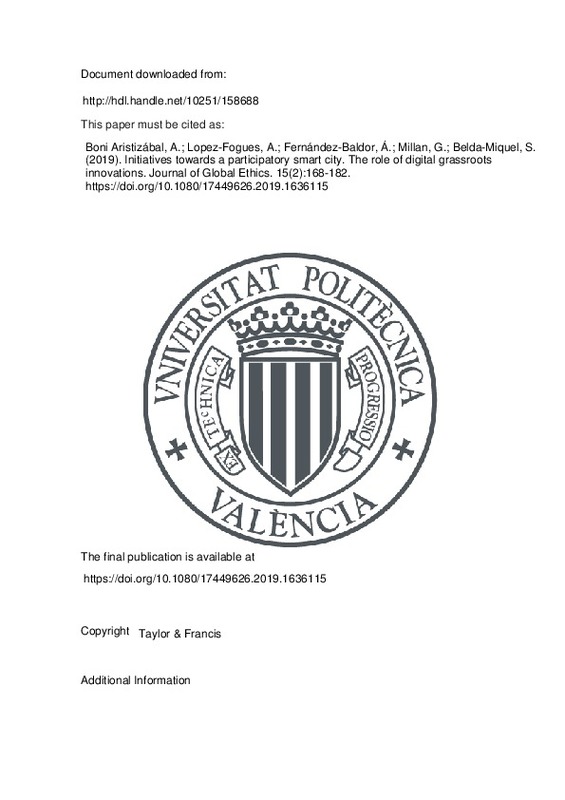JavaScript is disabled for your browser. Some features of this site may not work without it.
Buscar en RiuNet
Listar
Mi cuenta
Estadísticas
Ayuda RiuNet
Admin. UPV
Initiatives towards a participatory smart city. The role of digital grassroots innovations
Mostrar el registro sencillo del ítem
Ficheros en el ítem
| dc.contributor.author | Boni Aristizábal, Alejandra
|
es_ES |
| dc.contributor.author | Lopez-Fogues, Aurora
|
es_ES |
| dc.contributor.author | Fernández-Baldor, Álvaro
|
es_ES |
| dc.contributor.author | Millan, Gynna
|
es_ES |
| dc.contributor.author | Belda-Miquel, Sergio
|
es_ES |
| dc.date.accessioned | 2021-01-12T04:32:16Z | |
| dc.date.available | 2021-01-12T04:32:16Z | |
| dc.date.issued | 2019-07-30 | es_ES |
| dc.identifier.issn | 1744-9626 | es_ES |
| dc.identifier.uri | http://hdl.handle.net/10251/158688 | |
| dc.description.abstract | [EN] In this paper we explore the role of Digital Grassroots Innovation (DGI) in the construction of a more participatory smart city. 18 DGIs from four Spanish cities (Santander, Valencia, Bilbao, and San Sebastián) were analysed. They belong to 4 different types of digital innovation: Open Hardware: understood as projects inspired by the maker movement; Open Knowledge: large groups of citizens who join through online platforms to collectively create a new type of knowledge or social projects; Open Data: innovative ways of opening, capturing, using, analysing and interpreting data; and Open Networks: networks of citizens who are developing new networks and infrastructures, to collectively share resources and solve problems. In all cases, the DGIs constitute a varied repertoire of initiatives where the purpose of digital innovation is not only to solve problems that affect citizens, but also to make spaces for the creation and empowerment of critical citizens that are vigilant of the actions of public and private powers. In this sense, innovation not only refers to the design and materialisation of new products or processes, but also to the contribution that the DGI is making to the construction of citizenship and, therefore, to the construction of democracy. | es_ES |
| dc.description.sponsorship | This work was supported by INAP [grant number 140] and Plan Estatal de I + D+i under [grant number CSO2016-80152-R]. Ministerio de Ciencia e Innovación. | es_ES |
| dc.language | Inglés | es_ES |
| dc.publisher | Taylor & Francis | es_ES |
| dc.relation.ispartof | Journal of Global Ethics | es_ES |
| dc.rights | Reserva de todos los derechos | es_ES |
| dc.subject | Digital grassroots innovation | es_ES |
| dc.subject | Smart city | es_ES |
| dc.subject | Democracy | es_ES |
| dc.subject | Participation | es_ES |
| dc.subject | Local Council | es_ES |
| dc.subject | Spain | es_ES |
| dc.subject.classification | FILOSOFIA MORAL | es_ES |
| dc.subject.classification | PROYECTOS DE INGENIERIA | es_ES |
| dc.title | Initiatives towards a participatory smart city. The role of digital grassroots innovations | es_ES |
| dc.type | Artículo | es_ES |
| dc.identifier.doi | 10.1080/17449626.2019.1636115 | es_ES |
| dc.relation.projectID | info:eu-repo/grantAgreement/INAP//140/ | es_ES |
| dc.relation.projectID | info:eu-repo/grantAgreement/MINECO//CSO2016-80152-R/ES/INNOVACION DE BASE FRENTE AL CAMBIO CLIMATICO. APRENDIZAJES EN NICHOS DE INNOVACION SOCIAL PARA MEJORAR PRACTICAS Y POLITICAS PARA LA TRANSICION HACIA EL DESARROLLO HUMANO/ | es_ES |
| dc.rights.accessRights | Abierto | es_ES |
| dc.contributor.affiliation | Universitat Politècnica de València. Departamento de Proyectos de Ingeniería - Departament de Projectes d'Enginyeria | es_ES |
| dc.description.bibliographicCitation | Boni Aristizábal, A.; Lopez-Fogues, A.; Fernández-Baldor, Á.; Millan, G.; Belda-Miquel, S. (2019). Initiatives towards a participatory smart city. The role of digital grassroots innovations. Journal of Global Ethics. 15(2):168-182. https://doi.org/10.1080/17449626.2019.1636115 | es_ES |
| dc.description.accrualMethod | S | es_ES |
| dc.relation.publisherversion | https://doi.org/10.1080/17449626.2019.1636115 | es_ES |
| dc.description.upvformatpinicio | 168 | es_ES |
| dc.description.upvformatpfin | 182 | es_ES |
| dc.type.version | info:eu-repo/semantics/publishedVersion | es_ES |
| dc.description.volume | 15 | es_ES |
| dc.description.issue | 2 | es_ES |
| dc.relation.pasarela | S\392675 | es_ES |
| dc.contributor.funder | Instituto Nacional de Administración Pública | es_ES |
| dc.contributor.funder | Ministerio de Economía y Competitividad | es_ES |
| dc.description.references | Geels, F. W., & Schot, J. (2007). Typology of sociotechnical transition pathways. Research Policy, 36(3), 399-417. doi:10.1016/j.respol.2007.01.003 | es_ES |
| dc.description.references | Hollands, R. G. (2008). Will the real smart city please stand up? City, 12(3), 303-320. doi:10.1080/13604810802479126 | es_ES |
| dc.description.references | Luque-Ayala, A., & Marvin, S. (2015). Developing a critical understanding of smart urbanism? Urban Studies, 52(12), 2105-2116. doi:10.1177/0042098015577319 | es_ES |
| dc.description.references | McFarlane, C., & Söderström, O. (2017). On alternative smart cities. City, 21(3-4), 312-328. doi:10.1080/13604813.2017.1327166 | es_ES |
| dc.subject.ods | 09.- Desarrollar infraestructuras resilientes, promover la industrialización inclusiva y sostenible, y fomentar la innovación | es_ES |







![[Cerrado]](/themes/UPV/images/candado.png)

